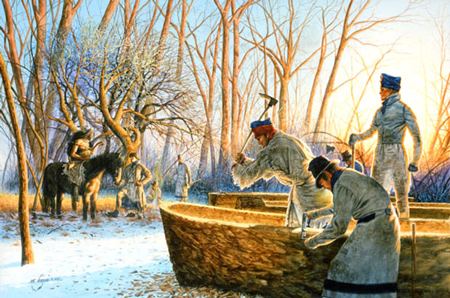The Fearsome Chief One Eye
by Yellowstone Public Radio[1]Originally aired weekdays by Yellowstone Public Radio during the Bicentennial observance of 2003-2006. Narrated by Hal Hansen. Scripts by Whit Hansen and Ed Jacobson. Produced by Leni Holliman. © … Continue reading
Dawn at Canoe Camp
© Michael Haynes, https://www.mhaynesart.com. Used with permission.
Grand Hidatsa Chief Le Borgne
on my return found the Manitarree [Hidatsa] Chief about Setting out on his return to his village, having recieved of Captain M. Lewis a medel Gorget armbans, a Flag Shirt, Scarlet &c. &c. &c. for which he was much pleased . . . . 2 guns were fired for this Great man
—William Clark
Inspecting Canoe Camp
walked up to See the Party that is makeing Perogues, about 5 miles above this . . . . found them nearly finished, the timber verry bad
—William Clark
Curiosity about York
In the course of the conversation, the chief observed that some foolish young men of his nation bad told him there was a person among us who was quite black, and he wished to know if it could be true. We assured him that it was true, and sent for York: the Borgne was very much surprised at his appearance, examined him closely, and spit on his finger and rubbed the skin in order to wash off the paint; nor was it until the negro uncovered his head, and showed his short hair, that the Borgne eould [sic] be persuaded that he was not a painted white man.
—Nicholas Biddle[2]Nicholas Biddle, History of the Expedition under the Command of Captains Lewis and Clark . . . (Philadelphia: Bradford and Inskeep, 1814), 1:163.
Le Borgne’s Opinion
North West Company Trader wrote about his time with the Hidatsa and Chief Le Borgne, summarizing the latter’s statements about the Lewis and Clark Expedition:
After haranguing the Indians and explaining to them the purport of his expedition to the Westward, several of them accepted clothing— but notwithstanding they could not be reconciled to like these strangers as they called them:— “Had these Whites come amongst us, Said the Chiefs, with charitable views they would have loaded their Great Boat with necessaries. It is true they have ammunition but they prefer throwing it away idly than sparing a shot of it to a poor Mandane.” The Indians admired the air Gun as it could discharge forty shots out of one load— but they dreaded the magic of the owners. “Had I these White warriors in the upper plains, said the Gros Ventres Chief, my young men on horseback would soon do for them, as they would do for so many wolves— for, continued he, there are only two sensible men among them—the worker of iron, and the mender of Guns.”
—Charles McKenzie[3]W. Raymond Wood and Thomas D. Thiessen, Early Fur Trade on the Northern Plains: Canadian Traders among the Mandan and Hidatsa Indians, 1738–1818 (Norman: University of Oklahoma Press, 1985), 232.
Weather Diary
State of Ther. at rise
Weather wind at rise
State of Thermt. at 4 OClock Weather at 4 Ock Wind at 4 OClock State of the River 2 [above 0] cloudy N. 18 [above 0] fair N W rise 2 in. wind hard all day. visited by the Birn the great Chief of the Big bellies
—Meriwether Lewis[4]To assist the reader, the editor of this web page has omitted the “Day of Month 1805” column and spelled out some of the abbreviations.
Experience the Lewis and Clark Trail
The Lewis and Clark Trail Experience—our sister site at lewisandclark.travel—connects the world to people and places on the Lewis and Clark Trail.
Plan a trip related to March 9, 1805:

Fort Mandan is a High Potential Historic Site along the Lewis and Clark National Historic Trail managed by the U.S. National Park Service. The North Dakota Department of Parks and Recreation manages a modern reconstruction and the Lewis and Clark Interpretive Center located at US Hwy 83 and ND Hwy 200A.
Knife River Indian Villages National Historic Site is a High Potential Historic Site along the Lewis and Clark National Historic Trail managed by the U.S. National Park Service. A unit of the National Park System, the site is located at 564 County Road 37, one-half mile north of Stanton, North Dakota. It has exhibits, trails, and a visitor center.
Notes
| ↑1 | Originally aired weekdays by Yellowstone Public Radio during the Bicentennial observance of 2003-2006. Narrated by Hal Hansen. Scripts by Whit Hansen and Ed Jacobson. Produced by Leni Holliman. © 2003 by Yellowstone Public Radio. |
|---|---|
| ↑2 | Nicholas Biddle, History of the Expedition under the Command of Captains Lewis and Clark . . . (Philadelphia: Bradford and Inskeep, 1814), 1:163. |
| ↑3 | W. Raymond Wood and Thomas D. Thiessen, Early Fur Trade on the Northern Plains: Canadian Traders among the Mandan and Hidatsa Indians, 1738–1818 (Norman: University of Oklahoma Press, 1985), 232. |
| ↑4 | To assist the reader, the editor of this web page has omitted the “Day of Month 1805” column and spelled out some of the abbreviations. |



